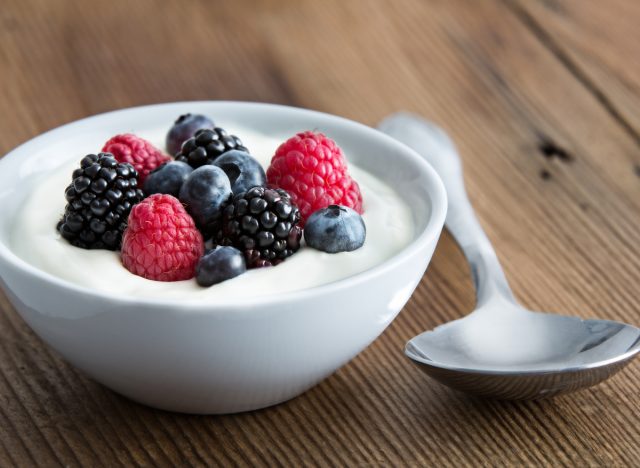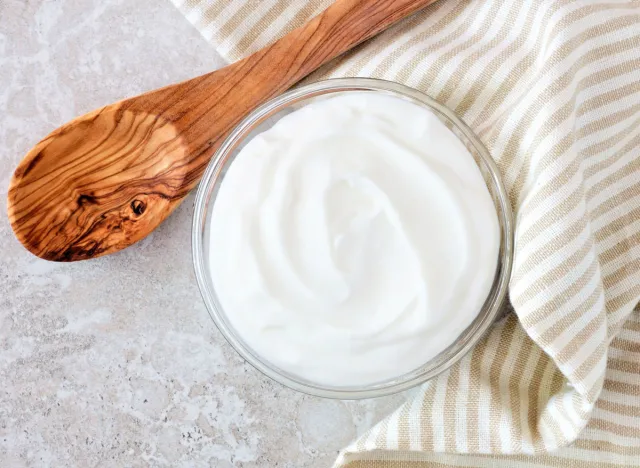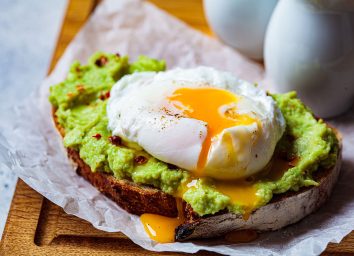The #1 Best Food to Reduce Belly Fat

Body fat is not all bad. In fact, you need it to survive. According to the American Heart Association, body fat not only helps keep your body warm, it’s also essential for absorbing nutrients and producing important hormones. However, there is one type that is bad for your health: visceral fat.
“Visceral fat is a type of body fat stored within your abdominal cavity that wraps around your internal organs; your liver, stomach, and intestines,” says Roxana Ehsani, MS, RD, CSSD, LDN, registered dietitian nutritionist and spokesperson for the Academy of Nutrition and Dietetics. “It’s not the same as the stomach fat that you may see.”
Although visceral fat isn’t visible from the outside, it can impact your health by raising your blood pressure and increasing your risk for developing certain conditions, such as heart disease, stroke, diabetes, insulin resistance, and even some cancers, says Ehsani.
One way to reduce visceral fat is to make some dietary adjustments, and you can start by adding one of the best, belly-fat-busting foods out there: plain, non-fat Greek yogurt. Read on to see why this food is so good at reducing harmful fat, and next, don’t miss these 22 Meals to Melt Belly Fat in 2022.
Why Greek yogurt can help reduce visceral fat.

“Research has suggested that foods rich in protein, calcium, and vitamin D may be linked to less visceral fat,” says Ehsani. “Therefore, plain, non-fat or low-fat Greek yogurt is the number one food that people should be adding to their diet if they are looking to reduce visceral fat.”
RELATED: Surprising Side Effects of Eating Yogurt, Says Science
One of the biggest benefits is its protein punch.
“Plain, non-fat Greek yogurt typically contains 20-23 grams of protein per 1 cup serving,” says Ehsani. “Eating protein-rich foods can help reduce hunger as it promotes feelings of satiety. It also makes you less likely to overeat when you have protein present at meal and snack times.”
Protein takes a long time to digest and metabolize, thus helping you feel more full for longer. Research also finds that high protein intake is linked to a lower BMI, smaller waist circumference, and better HDL (good) cholesterol levels. Plus, yogurt contains live and active cultures known as probiotics which help support a healthy gut microbiome.
Choosing plain Greek yogurt is key since it won’t be loaded with sugar.

“The flavored varieties tend to pack added sugar, which will not help reduce visceral fat,” says Ehsani. In fact, it may do the opposite. People who eat more added sugar tend to have more visceral fat, research suggests.
Ehsani says to choose non-fat or low-fat yogurt, as full-fat varieties contain saturated fat, and overeating saturated fat has been linked to promoting visceral fat; however, reducing your overall saturated fat intake (that includes foods like processed meats, cheese, and baked goods) is more important than making one choice to eat fat-free yogurt.
Tips to reduce visceral fat.
Besides adding some plain non-fat or low-fat Greek yogurt to your diet, other ways to reduce and/or prevent visceral fat, according to Ehsani, include:
- Eat protein at each meal and snack to keep you feeling satisfied.
- Eat enough dietary fiber each day to keep you full for longer and support a healthy GI tract.
- Get enough sleep. Chronic lack of sleep has been linked to overeating and weight gain.
- Exercise regularly.
- Drink plenty of water.
- Limit alcohol intake to dietary guidelines, which is no more than 1 drink a day for women and 2 drinks a day for men.
- Limit foods that are high in sugar or added sugars.









